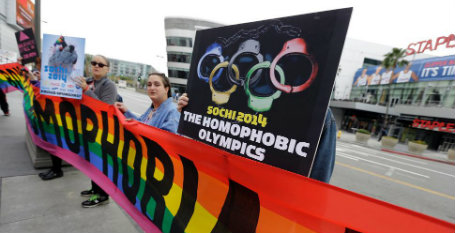This is a pivotal moment for equality in sport because the Olympic Movement has now stood up and officially recognized gay, lesbian and bi athletes and fans, say LGBT groups.
The International Olympic Committee has decided to toughen its stance and foster quality by including sexual orientation in its anti-discrimination policy, a move hailed by various LGBT groups.
The IOC on Dec 8 strengthened its “Principle 6” anti-discrimination rule to include sexual orientation to its Olympic Charter following last year’s furor over the Sochi winter Olympics in Russia, a country that enacted an anti-gay propaganda law that rights activists said was discriminating against gay people. The IOC and corporate sponsors were severely criticized for not doing enough to force Russia to repeal that legislation.
"The Olympic Movement has now stood up for love and equality by officially recognizing gay, lesbian and bi athletes and fans," Andre Banks, executive director of gay rights group All Out, said in a statement. “This is a pivotal moment for equality in sport,” said Banks.
"There is no greater sign of progress in combating homophobia in sports than to have the oldest organized athletic competition in the history of the world saying enough is enough," said Hudson Taylor, executive director of Athlete Ally.
Many groups also wanted the IOC to include the term gender identity in the amendment to protect transgender athletes, spectators and fans. However, the IOC chose not to add it.
Principle 6 of the Olympic charter already bars discrimination based on race, religion, gender and other factors. The new inclusion of sexual orientation will also be included in contracts between the IOC and future host cities where gays and lesbians face discrimination and harassment.
The IOC’s recent anti-gay policy also places pressure on FIFA, the international governing body of football because the World Cup will be held in Russia in 2018 and in Qatar in 2022.
The Russian capital of Moscow has banned gay Pride marches for years, and more recently Russia introduced federal laws banning the promotion of “non-traditional” relationships to minors. Qatar, where gay relations is illegal and can be punished with lashes and jail, has refused to say if gay athletes will be allowed in the country to participate in the tournament.
The International Olympic Committee has decided to toughen its stance and foster equality by including sexual orientation in its anti-discrimination policy, a move hailed by various LGBT groups.
The IOC on Dec 8 strengthened its “Principle 6” anti-discrimination rule to include sexual orientation to its Olympic Charter following last year’s furor over the Sochi winter Olympics in Russia, a country that enacted an anti-gay propaganda law that rights activists said was discriminating against gay people. The IOC and corporate sponsors were severely criticized for not doing enough to force Russia to repeal that legislation.
"The Olympic Movement has now stood up for love and equality by officially recognizing gay, lesbian and bi athletes and fans," Andre Banks, executive director of gay rights group All Out, said in a statement. “This is a pivotal moment for equality in sport,” said Banks.
"There is no greater sign of progress in combating homophobia in sports than to have the oldest organized athletic competition in the history of the world saying enough is enough," said Hudson Taylor, executive director of Athlete Ally.
Many groups also wanted the IOC to include the term gender identity in the amendment to protect transgender athletes, spectators and fans. However, the IOC chose not to add it.
Principle 6 of the Olympic charter already bars discrimination based on race, religion, gender and other factors. The new inclusion of sexual orientation will also be included in contracts between the IOC and future host cities where gays and lesbians face discrimination and harassment.
The IOC’s recent anti-gay policy also places pressure on FIFA, the international governing body of football because the World Cup will be held in Russia in 2018 and in Qatar in 2022.
The Russian capital of Moscow has banned gay Pride marches for years, and more recently Russia introduced federal laws banning the promotion of “non-traditional” relationships to minors. Qatar, where gay relations is illegal and can be punished with lashes and jail, has refused to say if gay athletes will be allowed in the country to participate in the tournament.












 列印版本
列印版本
















讀者回應
Hello my dear,
i am happy to contact you after
viewing your profile and it interest
me to contact you for a genuine relationship,
please contact me here(nicolemakuza1992@hotmail.com)
so that i will share my feelings with
you for further communication.
Thanks, your friend Nicole.
(nicolemakuza1992@hotmail.com)
請先登入再使用此功能。